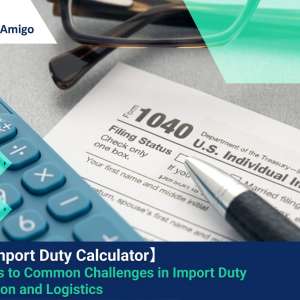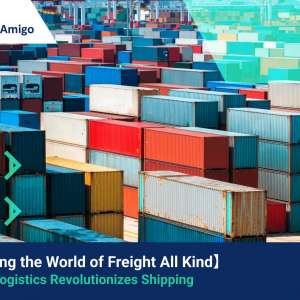Author Name: Tiffany Lee – Marketing Analyst at FreightAmigo
Sustainability in logistics, often connoted as green logistics, is emerging as the new dawn in the logistics industry. This pivotal shift, also known as logistics sustainability, emphasizes eco-friendly practices, creating a balance between operational efficiency and environmental responsibility. This article delves deep into the concept of sustainable logistics, its importance, benefits, challenges, and best practices, shedding light on the green transformation in the logistics sector, and providing a clear green logistics meaning.
Want To Compare The Best Express, Air Freight, Sea Freight, Rail Freight & Trucking Rates So As To Have Better Control On Cost?
Understanding Sustainable Logistics
Sustainable logistics and supply chain management, or green logistics, refers to the adoption of eco-friendly policies and practices in logistics operations, aimed at minimizing the environmental impact. These eco-friendly logistics practices involve reducing waste, fuel consumption, greenhouse gas emissions, and energy usage, thereby ensuring efficient supply chain management. It’s about finding a balance between ecology and economy, striving for an environmentally friendly yet economically viable logistics operation.
The Importance of Sustainable Logistics
The global logistics sector, a crucial catalyst for economic activity and a significant logistics environment, is witnessing an increasing demand for sustainable logistics management. The logistics industry has a significant environmental footprint, responsible for a substantial portion of global greenhouse gas emissions. This has led to an urgency for adopting sustainable strategies in logistics to reduce emissions, waste, and other environmental challenges associated with conventional logistics operations, making sustainable logistics companies more relevant than ever.
Sustainable logistics is becoming increasingly important due to several reasons:
- Regulatory Compliance: With the growing global focus on climate change, many countries have started implementing stringent environmental regulations. Adherence to sustainable logistics practices ensures compliance with these regulations, helping businesses avoid legal hassles and financial penalties.
- Reduced Operational Costs: Implementing green logistics often translates into significant cost savings in the long run. By reducing energy usage, waste generation, and fuel consumption, businesses can achieve higher operational efficiency and lower costs.
- Improved Brand Reputation: Companies that adopt sustainable logistics practices not only contribute to environmental conservation but also enhance their brand image. In a world where consumers are becoming increasingly eco-conscious, businesses that prioritize sustainability can gain a competitive edge.
Benefits of Sustainable Logistics
The adoption of sustainable supply chain practices in logistics offers numerous benefits, both to the business and the environment. Some of these benefits of supply chain sustainability include:
- Reduced Transportation Costs: By focusing on sustainable transportation, companies can reduce costs by lowering the time and mileage spent on shipping the same amount of deliveries. This results in significant cost reductions in the long run.
- Coping with Rising Supply and Energy Costs: Energy-efficient measures, such as the implementation of robust delivery management software, can help businesses deal with rising supply costs and energy expenses.
- Building Better Relationships with Customers: Companies that prioritize sustainability are more likely to win over customers. End-users are becoming more environmentally conscious and expect businesses to adopt green practices.
- Preparing for Future Regulations: Companies that adopt sustainable practices are better prepared for upcoming environmental regulations. Taking a proactive approach allows companies to stay ahead of the curve and avoid potential penalties or disruptions.
Challenges Facing Green Logistics
Despite its numerous benefits, the transition to green logistics is not without its challenges. Some of the most significant obstacles in the path of sustainable trucking and sustainable shipping companies, aiming for a reduced environmental footprint, include:
- High Upfront Costs: The initial cost of implementing sustainable practices can be substantial, deterring many businesses from adopting green logistics.
- Reliance on Fossil Fuels: The logistics industry, particularly the transport sector, relies heavily on fossil fuels. Finding effective and economically viable alternatives to fossil fuels remains a significant challenge.
- Lack of Infrastructure: The lack of infrastructure for alternative fuel vehicles and the high initial investment costs associated with them pose a significant barrier to the adoption of green logistics.
- Resistance to Change: Any significant change in operations can be met with resistance within an organization. Overcoming this resistance and fostering a culture of sustainability requires strong leadership and commitment.
Best Practices for Sustainable Logistics
While the journey towards sustainable logistics may seem daunting, numerous best practices can guide businesses in their green transformation. Some of these logistics best practices, which are often seen in green logistics companies, include:
- Optimized Route Planning: By optimizing delivery routes, businesses can reduce fuel consumption and thereby reduce carbon emissions. Leveraging technology for real-time tracking, route optimization, and predictive analytics can ensure timely and accurate deliveries, minimizing environmental impact.
- Use of Alternative Fuels: Investing in alternative fuels, such as biofuels or electric vehicles, can drastically reduce greenhouse gas emissions and lower transportation costs.
- Green Procurement Policies: Incorporating eco-friendly criteria in procurement policies can help businesses reduce their environmental footprint. This can involve prioritizing suppliers who adhere to sustainable practices or sourcing eco-friendly materials and packaging.
- Reducing and Recycling Waste: Embracing the principles of reducing, reusing, and recycling can transform logistics practices and significantly reduce waste. This can involve using sustainable packaging materials, implementing waste-sorting processes, and adhering to appropriate recycling procedures.
Sustainable logistics is not just a trend; it’s a necessity for both the environment and business longevity. It represents a strategic advantage over the competition, revaluating a brand, and setting it apart. By adopting green logistics transportation and other logistics initiatives, businesses can reduce their carbon footprint, optimize operations, and resonate with environmentally conscious consumers. As the environmental logistics company sector continues to evolve, prioritizing sustainability will become paramount, positioning businesses as forward-thinking industry leaders in the new green dawn of logistics.
There Are Different Options For Cargo Transportation. If You Want To Choose The Most Convenient And Suitable Solution, It Is Best To Have The Full Support Of Logistics Experts! If You Are Planning To Ship Goods Overseas, Please Go To The FreightAmigo Page For Inquiries.
===
Read More:
【Cosmetic Product Recycling】 A Guide to Sustainable Reverse Logistics
【Rise of Green Supply Chain】 Pioneering Sustainable Practices in Logistics
【ESG in Logistics】 How ESG Practices Drive Social Responsibility in Logistics
===
If you have any inquiries on logistics/supply chain, feel free to contact FreightAmigo now:
Chat with us online OR
Phone : +852 28121686
WhatsApp: +852 27467829









































